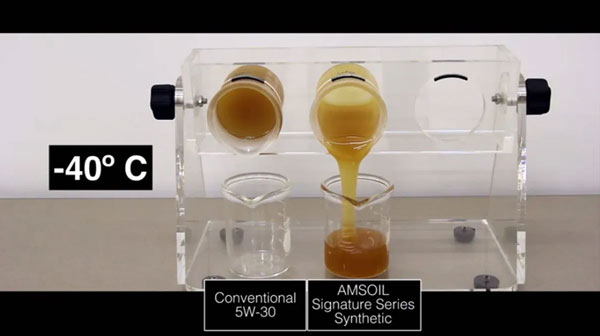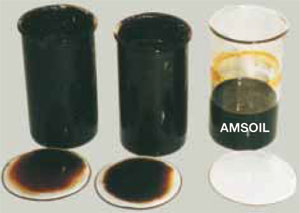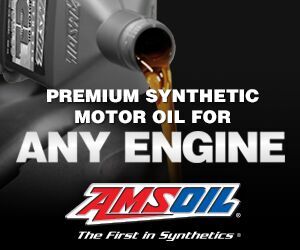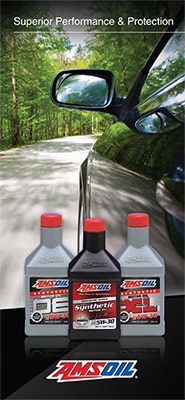FAQ
What Is Synthetic Oil?
AMSOIL synthetic motor oils are chemically engineered to form pure lubricants. They contain no contaminants or molecules that don’t serve a designed purpose. Their versatility and pure, uniform molecular structures impart properties that provide better friction-reduction, optimum fuel efficiency, maximum film strength, and extreme-temperature performance conventional lubricants just can’t touch.
Conventional lubricants, on the other hand, are refined from crude oil. Contaminating elements such as sulfur, nitrogen, oxygen, and metal components such as nickel or vanadium are inherent to crude oil and cannot be completely removed through the refining process. The oil refining process separates the various types of molecules in the oil by weight, leaving molecules similar in weight but dissimilar in structure, reducing performance.
Synthetic Oil vs Conventional Oil
Although you might know that synthetic oils outperform conventional oils, you might not understand why.
Differences begin at the molecular level
Synthetics don’t contain the impurities and molecular irregularities inherent to conventional oils. Synthetics’ pure, uniform molecular structures impart properties that provide wear protection, extreme-temperature performance and fuel efficiency conventional lubricants just can’t touch – all of which help you save money with vehicles that run better and last longer.
Engine Protection
Only a microscopic film of oil separates metal surfaces in your engine from touching and causing wear. AMSOIL synthetic motor oils form a more durable fluid film than conventional oils due to their resilient base oils. They reduce wear and help you maximize engine life.

Temperature Extremes – Cold
When the temperature drops, motor oils thicken and move slower, causing parts of your engine to remain unprotected for a short period of time. AMSOIL is more fluid at cold temperatures than the tested conventional oil, giving you easier and faster cold starts. This means it can reach vital components faster, providing more immediate engine protection and reduced wear.
 Temperature Extremes – Hot
Temperature Extremes – Hot
Vehicle manufacturers are altering engine designs to keep pace with increasingly strict fuel economy standards, resulting in engines that run hotter than ever. The average operating temperature is up to 235°F, and even hotter under heavy loads. This heat can quickly break down oil, leading to oxidation, sludge, and deposits. Comparison tests show AMSOIL keeps engines up to 5 times cleaner than conventional oil by better resisting the formation of deposits.
Maximizes Fuel Economy
The base oils used in conventional oils contain molecules of different sizes and weights as well as unwanted materials, like wax. This typically requires more energy to circulate throughout your engine, which can reduce fuel economy. Conversely, AMSOIL synthetic motor oils are formulated using molecularly uniform synthetic base oils that slip easily over one another and are free of unwanted materials. They help reduce energy lost to friction and maximize fuel economy.
Reduces Oil Consumption
If enough motor oil is consumed, eventually there may not be enough to reach all the complex parts of your engine, which can potentially cause damage. In independent motor oil tests, AMSOIL synthetic motor oil was better at reducing oil consumption than the tested conventional oil, requiring less-frequent top-offs.
Better for the Environment
AMSOIL synthetic motor oils are designed to reduce emissions, last longer, and reduce fuel consumption – all features that help prevent pollution. They resist volatilization (burn-off) better than conventional oils, which cuts tailpipe emissions, while extended-drain AMSOIL synthetic oils generate less waste oil and packaging waste since motorists use less oil throughout the year.
AMSOIL Guarantee
You can be confident that using AMSOIL synthetic lubricants or practicing extended oil drain intervals will not void your new vehicle or equipment manufacturer’s warranty. U.S. Federal Law (Magnuson Moss Warranty Act) says this is illegal; in America, you have the freedom to choose how you want to protect your equipment.
In addition, AMSOIL customers receive the second element of protection – the AMSOIL Guarantee – use AMSOIL synthetic engine oil as recommended in mechanically sound equipment, and the AMSOIL warranty covers lubricant-related failures! AMSOIL stands behind their products for as long as you use them. Unlike some other oil companies that will only guarantee their products up to a specified mileage, AMSOIL does not place restrictions on their warranty coverage based on total vehicle miles.
What Does it Take to Make an Engine Oil with the Longest
Oil Change Interval on the Market?
- Synthetic base stocks – Because of their outstanding ability to withstand the heat of the engine without breaking down, synthetic base stocks last longer. Base stock breakdown ends an oil’s functional life and fouls engines with sludge, varnish and acids. AMSOIL is made from the best synthetic base stock.
- Top quality additives – Premium-quality, long-life additives keep oils in spec over the long drain. Inferior additives allow oils to slip below their specified viscosity and allow acids to build and debris to fall out before reaching the filter, leading to corrosion, wear and sludge build up.
- Commitment – Virtually any oil company could offer motor oils with extended oil change intervals. The base stocks, additive systems and basic know-how are available. AMSOIL believes it pays to add high-quality additives to a long-life synthetic base stock – it pays in fewer oil changes, less waste oil, and it saves you, the customer, time and money.
In Summary
Today many high-performance cars, such as Corvette, are factory-filled with synthetic engine oils. That’s because synthetic oils are better for today’s engines. Conventional petroleum engine oils, which are refined from crude oil, are proving to be inadequate for the advancements in engine technology. Refining does not remove all of the contaminants from crude oil – contaminants that cause petroleum lubricants to evaporate and break down when they come in contact with heat and oxygen.
Because AMSOIL is designed in a laboratory from pure chemicals, it does not contain any contaminants that can change the quality of the oil. AMSOIL is resistant to heat and oxygen and can withstand the higher operating temperatures of today’s engines and, therefore, is able to last longer than any other motor oil on the market, saving you time and money. AMSOIL can actually cost less to use than conventional motor oil!
Switching to Synthetic Oil
Some Common FAQs About Changing to AMSOIL Synthetic Oil
Although there are no special requirements when switching to synthetic oil, we offer some guidelines when changing to AMSOIL synthetic oil to ensure your engine gets the most from your oil, plus we answer some commonly asked questions.
AMSOIL synthetic engine oils are extended life lubricants manufactured from select synthetic base stocks and special-purpose additives. These lubricants provide improved overall performance characteristics when compared to conventional motor oils.
AMSOIL introduced the first synthetic engine oil with an API (American Petroleum Institute) Service Classification in 1972. Since that time, the line of AMSOIL products has greatly expanded.
There are no special requirements when switching to synthetic oil. However, in older vehicles or those with high mileage, it is advisable to use AMSOIL Engine and Automatic Transmission Flush first. This will ensure that the engine is free of any accumulated contaminants that may affect the service life of AMSOIL synthetic engine oils. Installation of an AMSOIL Ea Oil Filter at every oil change is also recommended, but not necessary.
AMSOIL synthetic engine oils are formulated using premium synthetic base oils and the highest-quality additives that provide extended oil change capabilities. The unique synthetic formulation and robust TBN* retention of AMSOIL synthetic engine oils work to resist oxidation and neutralize the acids that shorten the service lives of other oils. AMSOIL synthetic engine oils perform so well for so long because they don’t break down in intense heat like conventional oils do – they don’t form deposits and they don’t volatize (burn-off), which can adversely affect lubricant performance by altering viscosity and increasing oil consumption. AMSOIL maintains its viscosity over longer periods of time than other oils and helps reduce oil consumption. Finally, AMSOIL’s additive package, a key element in a lubricant’s ability to function, holds up under engine stresses and remains serviceable for the recommended life of the oil.
*A motor oil’s TBN (Total Base Number) refers to the quantity of acid-neutralizing material present in the oil. (Detergent-alkalinity additives that fight high-temperature deposits, and neutralize acids.) The higher the TBN, the more effective the oil is, and the longer it will last.
AMSOIL synthetic engine oils can reduce oil consumption in mechanically sound engines. However, AMSOIL synthetic oils cannot fix engines that consume oil due to mechanical problems.
Yes. AMSOIL synthetic oils reduce friction and drag far better than conventional oils, which results in increased fuel economy. Because every vehicle is different, as are driving habits and conditions, it is difficult to accurately project an exact increase to expect. Fuel mileage increases ranging from 4% to 40% have been reported by AMSOIL customers.
Yes. Because AMSOIL synthetic engine oils are formulated with premium synthetic base oils, they provide superior high- and low-temperature performance. At high temperatures, no conventional motor oil can compare to the overall protection AMSOIL synthetic oils provide – AMSOIL synthetic oils resist thinning out to maintain critical protection in extreme heat. They also minimize sludge and deposit formation in high-temperature operation. AMSOIL synthetic oils have extremely low pour points and flow readily at extremely low temperatures for rapid cold starts and improved low-temperature operation compared to conventional oils.
Comparing AMSOIL with other engine oils is like comparing apples to oranges; AMSOIL is really a different class of product. Like anything of real value, the true consumer cost doesn’t end with the off-the-shelf price. AMSOIL synthetic engine oils are extremely cost-effective compared to conventional 3,000-mile drain interval oils, with savings realized in fewer oil changes, reduced downtime, increased fuel economy, reduced maintenance, and extended engine life. Though the price per quart may be higher, AMSOIL synthetic oils actually cost less to use than conventional oils and save you money!
Absolutely! AMSOIL synthetic oils are perfectly safe for use in both new and high-mileage engines.
Absolutely not! Local car dealers might claim it will, but that is not the position of the auto manufacturers who actually offer the warranties. Manufacturers’ warranties are based upon the use of oils meeting specific API Service Classifications and AMSOIL lubricants exceed the current API Service requirements. Auto manufacturers will only refuse to honor their warranties if it is proven that a problem is oil related. If the oil didn’t cause the problem, the warranty cannot be voided, regardless of brand or length of time in use. In addition, AMSOIL customers receive the second element of protection - the AMSOIL Warranty - use AMSOIL synthetic oil as recommended in mechanically sound equipment, and the warranty covers lubricant-related failures!
No. AMSOIL synthetic engine oils can be safely used during break-in. In fact, many vehicles, including the Dodge Viper and Chevrolet Corvette, are factory-filled with synthetic oil.
No. Synthetic oils do not cause engines to leak oil. In fact, AMSOIL synthetic engine oil is fully compatible with modern seal materials and is properly formulated to condition seals, keeping them pliable to prevent leakage.
Absolutely not. Switching from petroleum oil to synthetic oil in routinely maintained vehicles will not cause clogged oil filters or passageways, regardless of mileage. Sludge, which is caused by poor-quality oil and neglected maintenance practices, would have to be present in significant amounts to plug oil filters and passageways. If an excessive amount of sludge is present in an engine, it is just a matter of time before oil filters and passageways clog, regardless of the installation of synthetic engine oil.
Yes. AMSOIL synthetic oils are fully compatible with all other synthetic or petroleum engine oils. Mixing AMSOIL with conventional oil is perfectly safe, if the need arises, but is not recommended since the conventional oil will detract from AMSOIL’s performance. It will also shorten the oil’s life expectancy and AMSOIL does not support extended oil change intervals where oils have been mixed. Mixing other oils with AMSOIL engine oils may also void the AMSOIL warranty.
No, they are not necessary! AMSOIL synthetic oils are properly formulated under the strictest quality control procedures to provide superior lubrication performance. In fact, doing so could upset the chemical balance of the AMSOIL synthetic oil and void the AMSOIL warranty.
 Be In the Know!
Be In the Know!
Engine Oil Additives Can Cause Engine Damage!
AMSOIL formulations are proprietary and they do not divulge specifics regarding the type of synthetic base stocks used in their synthetic lubricants. AMSOIL developed the world’s first API-qualified synthetic motor oil in 1972 and has remained the leader in the synthetic lubricant industry by continually researching new technologies and demanding only the highest-quality raw materials. As the company moves forward with new technologies, it is increasingly more important that this information remains proprietary.
AMSOIL views synthetic base oils the same as it views additives, with each having its own set of unique properties. AMSOIL does not insist on a particular type of base stock but insists on particular performance parameters. AMSOIL chooses whichever synthetic base stock or combination of base stocks delivers the desired result and tailors its lubricants to be application-specific (gasoline, diesel, racing, transmission, gear, extended drain, extreme temperatures, etc.). At the end of the day, the type of base stock used to formulate the oil is inconsequential; the product’s performance is what matters.
Important Facts About API Licensing
An API (American Petroleum Institute) license indicates that a specific motor oil formulation has passed the minimum performance standards as defined by a series of laboratory bench, physical, chemical, and engine tests. These tests and minimum performance standards are determined by the API Lubricants Committee to address specific areas such as engine wear, deposits, fuel economy, and emissions. The committee is comprised of representatives from automobile, oil, and additive companies.
Additive companies develop licensed formulas that they offer to oil companies to re-license. It is inexpensive to re-license one of these formulas, and the majority of oil companies choose to do this to avoid the costs associated with testing their own formulas. This lowers the value of such engine oils because the same chemistry is being sold under many brand names. The lubricant formulas from AMSOIL INC. are unique and proprietary.
API licensing was originally developed for mineral-based oils, and it affords these oils more flexibility than synthetic oils. Conventional oils comprised of petroleum base stocks may use a simple program called base stock interchange for added flexibility in manufacturing and purchasing. Interchange means that by completing the proper paperwork and running a few minor tests an oil company can choose to buy these petroleum base stocks from many different suppliers. This ensures adequate supply and competitive pricing. However, synthetic base stocks are supplier-specific and base stock interchange is not allowed. For example, if a formula was tested with an ester base stock from a specific supplier, then only that supplier's ester can be used. Complete engine testing would be required to use that exact same ester from another supplier and is therefore not performed because of the associated costs. This inflexibility makes price negotiations with synthetic base stock suppliers very difficult and increases business risk. Supply disruptions from only one source could shut down production.
There is also something called viscosity grade read-across. Fortunately, this applies to both petroleum and synthetic base stocks, although the better cold-temperature performance of synthetics makes it more difficult to achieve in some situations. The read-across guidelines ensure that if a manufacturer properly formulates the lubricant for which all of the API tests have been performed, then the manufacturer may use that same basic formula to make more grades (i.e. 5W-20, 5W-30, 10W-30, etc.) of the same motor oil.
Finally, there is a rule for substitutions in the Chemical Manufacturers Association (CMA) code of practice that allows a small degree of flexibility for all formulas. It allows a company to make changes to certain components in the formula with limited testing and paperwork requirements, provided that the additives are at the same or higher concentration.
If all AMSOIL motor oils were API licensed, the company could not source new raw materials from multiple suppliers, which would greatly increase the threat of supply disruption and the likelihood of extraordinarily high prices. To solve this problem, the API must establish base stock interchange guidelines for synthetic base stocks just as they have for other base stocks, as well as develop interchange guidelines for other components too. Furthermore, licensing formulas limits the ability to quickly adopt new technologies as they are discovered; each variation from the original licensed formula requires re-submission for complete engine testing.
First, AMSOIL, INC. works closely with major additive companies to select the top-performing, and usually most expensive, passenger car and heavy-duty diesel motor oil additives. These additives have already passed all of the API licensing requirements in a petroleum- or synthetic-based formulation. Then, AMSOIL works with the additive company to maximize the amount of additive used and to boost the additive package in selected performance areas to achieve an optimum performing additive package for the intended application. This is unlike many other oil companies that, because additives are expensive, use the minimum amount of the least expensive additives required to meet the minimum API requirements.
AMSOIL then uses a combination of synthetic base stocks with known performance characteristics as replacements for the petroleum base stocks to optimize performance in areas of lubricity, volatility, viscosity index, oxidation and nitration resistance, pour point, flash point, deposit control, soot handling, emissions and many other areas as well. AMSOIL also uses a high-quality V.I. (Viscosity Index) improver with outstanding viscosity and cleanliness properties. This replaces the inexpensive, low-quality V.I. improver used in standard API-licensed petroleum formulas. AMSOIL does laboratory bench tests and runs field tests to verify the superiority of the synthetic formula. AMSOIL continues to monitor the performance of the oil through close scrutiny of tens of thousands of oil analysis tests per year across a wide variety of vehicles all around North America and the world. AMSOIL, INC. has been collecting used synthetic oil samples from passenger cars since 1982. No other oil company has such a vast database of the performance of synthetic lubricants over extended drain intervals. AMSOIL products and formulations outperform API-licensed oils because they are engineered for top performance from the very beginning.
How Does AMSOIL Synthetic Engine Oils Compare to Other Engine Oils?
The importance of using good-quality oil in an engine cannot be overstated. AMSOIL synthetic engine oils consistently outperform conventional and other synthetic oils in virtually every category of performance, including wear protection, extreme high- and low-temperature performance, foam control, viscosity retention, rust and corrosion protection, volatility, and fuel economy. While other brands may provide good performance in some of these areas, AMSOIL synthetic engine oils consistently perform at the top in every category. Drivers can have confidence knowing that AMSOIL synthetic engine oils provide maximum performance and protection.

Move Up to AMSOIL
We hope this answers all of your questions about switching to AMSOIL synthetic oil! If you have any further questions, please contact us. We encourage you to visit any one of our AMSOIL retailers that we have partnered with and Move Up to AMSOIL today!
- • Gasoline Engine Oil
- • Diesel Engine Oil
- • European Engine Oil
- • Racing & High-Performance Engine Oil
- • Motorcycle Engine Oil
- • ATV-UTV Engine Oil
- • Marine Engine Oil
- • 4-Stroke Engine Oil
- • 2-Stroke Engine Oil
- • Natural Gas Engine Oil
- • Engine Assembly Lube
- • Gear Lube
- • Grease
- • Shock & Fork Oil
- • Bar, Chain & Gearbox Oil
- • Automatic Transmission Fluid
- • ATV-UTV Transmission Fluid
- • Hydrostatic Transmission Fluid
- • Brake Fluid
- • Power Steering Fluid
- • Antifreeze and Engine Coolant
- • Radiator Coolant Additive
- • Air Compressor Oil
- • Air Tool Oil
- • Hydraulic Oil
- • Oil Analysis
- • Engine Oil Filters
- • Metal Protectors
- • Silicone Lube
- • Engine Cleaners
- • Gasoline Additives
- • Diesel Fuel Additives
Our Word-of-Mouth Advertising Starts with You!
We appreciate it when our customers spread the word about us, which they often do. If you want your favorite retailer to stock AMSOIL, download the AMSOIL Fact Sheet. Our phone number is on the Fact Sheet and all they have to do is call us. Or, contact us and we’ll give them a call for you! We partner with businesses nationwide.





